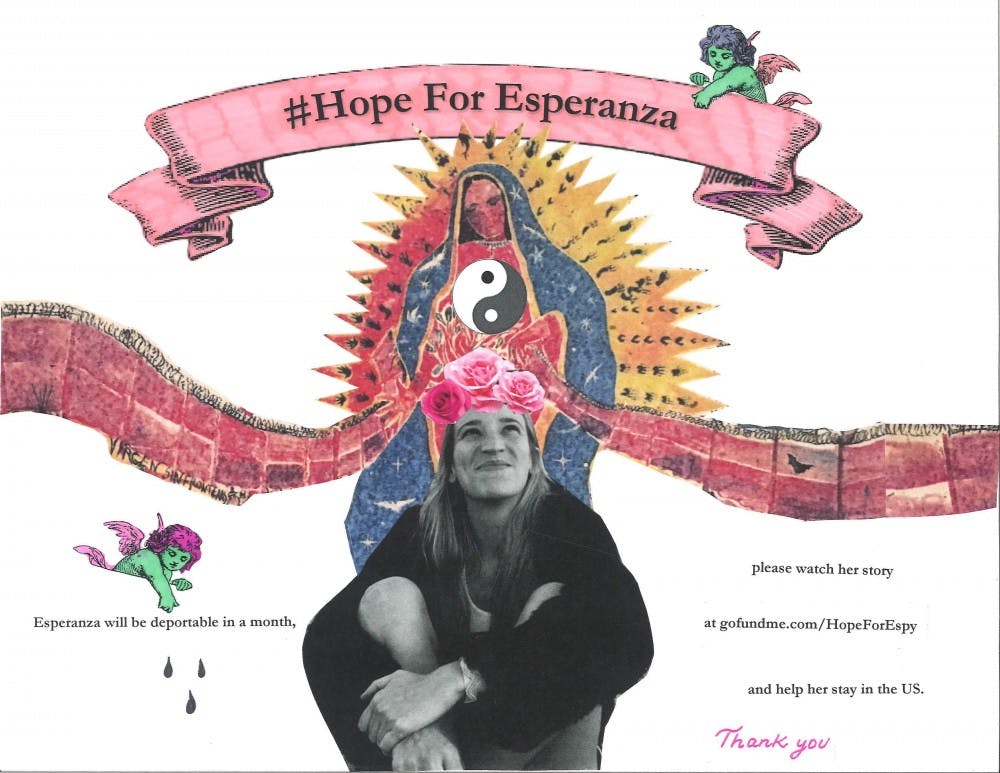Esperanza Franco found her passion working at a non–profit organization in Tucson, Arizona, where she defended immigrants in deportation proceedings. And yet, three weeks ago, she was facing her own deportation.
Franco was born and raised in the Canary Islands, a scenic Atlantic Ocean Territory of Spain. She studied law and international relations at ICADA School of Law, a prestigious law school in Madrid, and then moved to the United States, where she initially worked as an intern at a law firm in Michigan before attending Penn Law School. She graduated Penn Law in 2015, earned a juris doctorate in May 2017 from the University of Arizona, and signed on with the Florence Project.
The Florence Project is a nonprofit organization that supports detained immigrants who have lost the right to a public defender by providing them with free legal and social services. Franco and her colleagues travel to meet these immigrants, hear their stories, and connect with them emotionally. Although it was exhausting, Franco enjoyed the time she was working with immigrants. She says, “I like connecting with my clients. Just being there and supporting people emotionally and spiritually is very fulfilling.”
This past July, Esperanza’s student visa expired. She wasn’t selected in the lottery for a work visa, and was, thus, given 60 days to leave the country or enroll into another school. Otherwise, on September 10, she would become deportable.
Congress only allows for 65,000 H–1B work visas to be given to foreign professionals. The government holds a lottery, and whoever is selected is granted with a work permit to stay in the country. Certain jobs are cap–exempt and don’t have to go through the lottery, including nonprofits that have an affiliation with a college or university.
Franco asked her employer to help her submit a cap–exempt application. The Florence Project told her that they would first seek her visa through the lottery system, and then apply for a cap-exempt status if she wasn’t selected. After Franco lost her chance in the lottery, the project didn’t have her application ready on time to submit before her student visa expired.

Provided by Esperanza Franco
However, according to an interview with the project director Lauren Dasse by The Inquirer, the Florence Project said that they tried everything to help her and concluded that its relationship with the university did not meet the legal requirements of affiliation.
Fortunately, Franco was able to raise $11,803 through a GoFundMe campaign that helped her to enroll into a community college to extenuate her student visa status. There, she will be studying psychology, digital information, and dance.
Franco finds herself with more leveraging power on shaping the law by being a lawyer in the US. She says that here in the states, a judge’s ruling is bounded by decisions of earlier judges, which is not the case in Spain. A lawyer in the states can potentially leave an indelible mark on the history of law, which is something Franco aspires to accomplish.
Franco hasn’t been back home for about a year. Besides the expensive costs of flight tickets to the Canary Islands, Franco doesn’t feel safe now leaving the country. Last year, when she was traveling back to the states, she was referred to the secondary inspection. She recalls the feelings of being stalled there and says, “I felt like something is wrong with me, but there’s nothing wrong.”
Admittedly, some might think Franco’s choice to stay in the United States is crazy. But from Franco’s perspective, she feels the need to fight against the immigration system, especially after seeing firsthand how flawed the current situation is for immigrants in America.
“Trump is trying to delete the 60–day grace period now, and I think it’s so unfair," she says. “It’s frustrating that the US is turning down so many international talents right now.”
As an international student, Franco has invested not only her time and money, but also her heart and soul to this country. She overcame the English language barrier and took the Bar exam twice. Her parents in the Canary Islands took out loans to support her education. “Certain international students should have the right to stay longer,” Franco says. “If I have a master and a juris doctorate, it’s an investment itself. That’s almost like an investment visa."
After her past two months of walking on a tightrope, Franco is now giving herself a break to be healed from stress. As she is looking ahead and thinking about the future, she says that she might volunteer or work with some professors from University of Arizona. But everything she does now, she does carefully.







